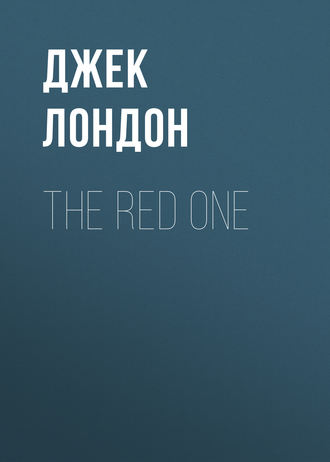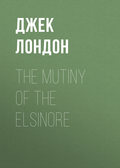
Джек Лондон
The Red One
For himself, he fabricated a special taboo. Only could he marry, he explained, when the Southern Cross rode highest in the sky. Knowing his astronomy, he thus gained a reprieve of nearly nine months; and he was confident that within that time he would either be dead or escaped to the coast with full knowledge of the Red One and of the source of the Red One’s wonderful voice. At first he had fancied the Red One to be some colossal statue, like Memnon, rendered vocal under certain temperature conditions of sunlight. But when, after a war raid, a batch of prisoners was brought in and the sacrifice made at night, in the midst of rain, when the sun could play no part, the Red One had been more vocal than usual, Bassett discarded that hypothesis.
In company with Balatta, sometimes with men and parties of women, the freedom of the jungle was his for three quadrants of the compass. But the fourth quadrant, which contained the Red One’s abiding place, was taboo. He made more thorough love to Balatta – also saw to it that she scrubbed herself more frequently. Eternal female she was, capable of any treason for the sake of love. And, though the sight of her was provocative of nausea and the contact of her provocative of despair, although he could not escape her awfulness in his dream-haunted nightmares of her, he nevertheless was aware of the cosmic verity of sex that animated her and that made her own life of less value than the happiness of her lover with whom she hoped to mate. Juliet or Balatta? Where was the intrinsic difference? The soft and tender product of ultra-civilization, or her bestial prototype of a hundred thousand years before her? – there was no difference.
Bassett was a scientist first, a humanist afterward. In the jungle-heart of Guadalcanal he put the affair to the test, as in the laboratory he would have put to the test any chemical reaction. He increased his feigned ardour for the bushwoman, at the same time increasing the imperiousness of his will of desire over her to be led to look upon the Red One face to face. It was the old story, he recognized, that the woman must pay, and it occurred when the two of them, one day, were catching the unclassified and unnamed little black fish, an inch long, half-eel and half-scaled, rotund with salmon-golden roe, that frequented the fresh water, and that were esteemed, raw and whole, fresh or putrid, a perfect delicacy. Prone in the muck of the decaying jungle-floor, Balatta threw herself, clutching his ankles with her hands kissing his feet and making slubbery noises that chilled his backbone up and down again. She begged him to kill her rather than exact this ultimate love-payment. She told him of the penalty of breaking the taboo of the Red One – a week of torture, living, the details of which she yammered out from her face in the mire until he realized that he was yet a tyro in knowledge of the frightfulness the human was capable of wreaking on the human.
Yet did Bassett insist on having his man’s will satisfied, at the woman’s risk, that he might solve the mystery of the Red One’s singing, though she should die long and horribly and screaming. And Balatta, being mere woman, yielded. She led him into the forbidden quadrant. An abrupt mountain, shouldering in from the north to meet a similar intrusion from the south, tormented the stream in which they had fished into a deep and gloomy gorge. After a mile along the gorge, the way plunged sharply upward until they crossed a saddle of raw limestone which attracted his geologist’s eye. Still climbing, although he paused often from sheer physical weakness, they scaled forest-clad heights until they emerged on a naked mesa or tableland. Bassett recognized the stuff of its composition as black volcanic sand, and knew that a pocket magnet could have captured a full load of the sharply angular grains he trod upon.
And then holding Balatta by the hand and leading her onward, he came to it – a tremendous pit, obviously artificial, in the heart of the plateau. Old history, the South Seas Sailing Directions, scores of remembered data and connotations swift and furious, surged through his brain. It was Mendana who had discovered the islands and named them Solomon’s, believing that he had found that monarch’s fabled mines. They had laughed at the old navigator’s child-like credulity; and yet here stood himself, Bassett, on the rim of an excavation for all the world like the diamond pits of South Africa.
But no diamond this that he gazed down upon. Rather was it a pearl, with the depth of iridescence of a pearl; but of a size all pearls of earth and time, welded into one, could not have totalled; and of a colour undreamed of in any pearl, or of anything else, for that matter, for it was the colour of the Red One. And the Red One himself Bassett knew it to be on the instant. A perfect sphere, full two hundred feet in diameter, the top of it was a hundred feet below the level of the rim. He likened the colour quality of it to lacquer. Indeed, he took it to be some sort of lacquer, applied by man, but a lacquer too marvellously clever to have been manufactured by the bush-folk. Brighter than bright cherry-red, its richness of colour was as if it were red builded upon red. It glowed and iridesced in the sunlight as if gleaming up from underlay under underlay of red.
In vain Balatta strove to dissuade him from descending. She threw herself in the dirt; but, when he continued down the trail that spiralled the pit-wall, she followed, cringing and whimpering her terror. That the red sphere had been dug out as a precious thing, was patent. Considering the paucity of members of the federated twelve villages and their primitive tools and methods, Bassett knew that the toil of a myriad generations could scarcely have made that enormous excavation.
He found the pit bottom carpeted with human bones, among which, battered and defaced, lay village gods of wood and stone. Some, covered with obscene totemic figures and designs, were carved from solid tree trunks forty or fifty feet in length. He noted the absence of the shark and turtle gods, so common among the shore villages, and was amazed at the constant recurrence of the helmet motive. What did these jungle savages of the dark heart of Guadalcanal know of helmets? Had Mendana’s men-at-arms worn helmets and penetrated here centuries before? And if not, then whence had the bush-folk caught the motive?
Advancing over the litter of gods and bones, Balatta whimpering at his heels, Bassett entered the shadow of the Red One and passed on under its gigantic overhang until he touched it with his finger-tips. No lacquer that. Nor was the surface smooth as it should have been in the case of lacquer. On the contrary, it was corrugated and pitted, with here and there patches that showed signs of heat and fusing. Also, the substance of it was metal, though unlike any metal, or combination of metals, he had ever known. As for the colour itself, he decided it to be no application. It was the intrinsic colour of the metal itself.
He moved his finger-tips, which up to that had merely rested, along the surface, and felt the whole gigantic sphere quicken and live and respond. It was incredible! So light a touch on so vast a mass! Yet did it quiver under the finger-tip caress in rhythmic vibrations that became whisperings and rustlings and mutterings of sound – but of sound so different; so elusively thin that it was shimmeringly sibilant; so mellow that it was maddening sweet, piping like an elfin horn, which last was just what Bassett decided would be like a peal from some bell of the gods reaching earthward from across space.
He looked at Balatta with swift questioning; but the voice of the Red One he had evoked had flung her face downward and moaning among the bones. He returned to contemplation of the prodigy. Hollow it was, and of no metal known on earth, was his conclusion. It was right-named by the ones of old-time as the Star-Born. Only from the stars could it have come, and no thing of chance was it. It was a creation of artifice and mind. Such perfection of form, such hollowness that it certainly possessed, could not be the result of mere fortuitousness. A child of intelligences, remote and unguessable, working corporally in metals, it indubitably was. He stared at it in amaze, his brain a racing wild-fire of hypotheses to account for this far-journeyer who had adventured the night of space, threaded the stars, and now rose before him and above him, exhumed by patient anthropophagi, pitted and lacquered by its fiery bath in two atmospheres.
But was the colour a lacquer of heat upon some familiar metal? Or was it an intrinsic quality of the metal itself? He thrust in the blue-point of his pocket-knife to test the constitution of the stuff. Instantly the entire sphere burst into a mighty whispering, sharp with protest, almost twanging goldenly, if a whisper could possibly be considered to twang, rising higher, sinking deeper, the two extremes of the registry of sound threatening to complete the circle and coalesce into the bull-mouthed thundering he had so often heard beyond the taboo distance.
Forgetful of safety, of his own life itself, entranced by the wonder of the unthinkable and unguessable thing, he raised his knife to strike heavily from a long stroke, but was prevented by Balatta. She upreared on her own knees in an agony of terror, clasping his knees and supplicating him to desist. In the intensity of her desire to impress him, she put her forearm between her teeth and sank them to the bone.
He scarcely observed her act, although he yielded automatically to his gentler instincts and withheld the knife-hack. To him, human life had dwarfed to microscopic proportions before this colossal portent of higher life from within the distances of the sidereal universe. As had she been a dog, he kicked the ugly little bushwoman to her feet and compelled her to start with him on an encirclement of the base. Part way around, he encountered horrors. Even, among the others, did he recognize the sun-shrivelled remnant of the nine-years girl who had accidentally broken Chief Vngngn’s personality taboo. And, among what was left of these that had passed, he encountered what was left of one who had not yet passed. Truly had the bush-folk named themselves into the name of the Red One, seeing in him their own image which they strove to placate and please with such red offerings.
Farther around, always treading the bones and images of humans and gods that constituted the floor of this ancient charnel-house of sacrifice, he came upon the device by which the Red One was made to send his call singing thunderingly across the jungle-belts and grass-lands to the far beach of Ringmanu. Simple and primitive was it as was the Red One’s consummate artifice. A great king-post, half a hundred feet in length, seasoned by centuries of superstitious care, carven into dynasties of gods, each superimposed, each helmeted, each seated in the open mouth of a crocodile, was slung by ropes, twisted of climbing vegetable parasites, from the apex of a tripod of three great forest trunks, themselves carved into grinning and grotesque adumbrations of man’s modern concepts of art and god. From the striker king-post, were suspended ropes of climbers to which men could apply their strength and direction. Like a battering ram, this king-post could be driven end-onward against the mighty red-iridescent sphere.
Here was where Ngurn officiated and functioned religiously for himself and the twelve tribes under him. Bassett laughed aloud, almost with madness, at the thought of this wonderful messenger, winged with intelligence across space, to fall into a bushman stronghold and be worshipped by ape-like, man-eating and head-hunting savages. It was as if God’s World had fallen into the muck mire of the abyss underlying the bottom of hell; as if Jehovah’s Commandments had been presented on carved stone to the monkeys of the monkey cage at the Zoo; as if the Sermon on the Mount had been preached in a roaring bedlam of lunatics.
The slow weeks passed. The nights, by election, Bassett spent on the ashen floor of the devil-devil house, beneath the ever-swinging, slow-curing heads. His reason for this was that it was taboo to the lesser sex of woman, and therefore, a refuge for him from Balatta, who grew more persecutingly and perilously loverly as the Southern Cross rode higher in the sky and marked the imminence of her nuptials. His days Bassett spent in a hammock swung under the shade of the great breadfruit tree before the devil-devil house. There were breaks in this programme, when, in the comas of his devastating fever-attacks, he lay for days and nights in the house of heads. Ever he struggled to combat the fever, to live, to continue to live, to grow strong and stronger against the day when he would be strong enough to dare the grass-lands and the belted jungle beyond, and win to the beach, and to some labour-recruiting, black-birding ketch or schooner, and on to civilization and the men of civilization, to whom he could give news of the message from other worlds that lay, darkly worshipped by beastmen, in the black heart of Guadalcanal’s midmost centre.
On the other nights, lying late under the breadfruit tree, Bassett spent long hours watching the slow setting of the western stars beyond the black wall of jungle where it had been thrust back by the clearing for the village. Possessed of more than a cursory knowledge of astronomy, he took a sick man’s pleasure in speculating as to the dwellers on the unseen worlds of those incredibly remote suns, to haunt whose houses of light, life came forth, a shy visitant, from the rayless crypts of matter. He could no more apprehend limits to time than bounds to space. No subversive radium speculations had shaken his steady scientific faith in the conservation of energy and the indestructibility of matter. Always and forever must there have been stars. And surely, in that cosmic ferment, all must be comparatively alike, comparatively of the same substance, or substances, save for the freaks of the ferment. All must obey, or compose, the same laws that ran without infraction through the entire experience of man. Therefore, he argued and agreed, must worlds and life be appanages to all the suns as they were appanages to the particular of his own solar system.
Even as he lay here, under the breadfruit tree, an intelligence that stared across the starry gulfs, so must all the universe be exposed to the ceaseless scrutiny of innumerable eyes, like his, though grantedly different, with behind them, by the same token, intelligences that questioned and sought the meaning and the construction of the whole. So reasoning, he felt his soul go forth in kinship with that august company, that multitude whose gaze was forever upon the arras of infinity.
Who were they, what were they, those far distant and superior ones who had bridged the sky with their gigantic, red-iridescent, heaven-singing message? Surely, and long since, had they, too, trod the path on which man had so recently, by the calendar of the cosmos, set his feet. And to be able to send a message across the pit of space, surely they had reached those heights to which man, in tears and travail and bloody sweat, in darkness and confusion of many counsels, was so slowly struggling. And what were they on their heights? Had they won Brotherhood? Or had they learned that the law of love imposed the penalty of weakness and decay? Was strife, life? Was the rule of all the universe the pitiless rule of natural selection? And, and most immediately and poignantly, were their far conclusions, their long-won wisdoms, shut even then in the huge, metallic heart of the Red One, waiting for the first earth-man to read? Of one thing he was certain: No drop of red dew shaken from the lion-mane of some sun in torment, was the sounding sphere. It was of design, not chance, and it contained the speech and wisdom of the stars.
What engines and elements and mastered forces, what lore and mysteries and destiny-controls, might be there! Undoubtedly, since so much could be enclosed in so little a thing as the foundation stone of a public building, this enormous sphere should contain vast histories, profounds of research achieved beyond man’s wildest guesses, laws and formulæ that, easily mastered, would make man’s life on earth, individual and collective, spring up from its present mire to inconceivable heights of purity and power. It was Time’s greatest gift to blindfold, insatiable, and sky-aspiring man. And to him, Bassett, had been vouchsafed the lordly fortune to be the first to receive this message from man’s interstellar kin!
No white man, much less no outland man of the other bush-tribes, had gazed upon the Red One and lived. Such the law expounded by Ngurn to Bassett. There was such a thing as blood brotherhood. Bassett, in return, had often argued in the past. But Ngurn had stated solemnly no. Even the blood brotherhood was outside the favour of the Red One. Only a man born within the tribe could look upon the Red One and live. But now, his guilty secret known only to Balatta, whose fear of immolation before the Red One fast-sealed her lips, the situation was different. What he had to do was to recover from the abominable fevers that weakened him, and gain to civilization. Then would he lead an expedition back, and, although the entire population of Guadalcanal he destroyed, extract from the heart of the Red One the message of the world from other worlds.
But Bassett’s relapses grew more frequent, his brief convalescences less and less vigorous, his periods of coma longer, until he came to know, beyond the last promptings of the optimism inherent in so tremendous a constitution as his own, that he would never live to cross the grass lands, perforate the perilous coast jungle, and reach the sea. He faded as the Southern Cross rose higher in the sky, till even Balatta knew that he would be dead ere the nuptial date determined by his taboo. Ngurn made pilgrimage personally and gathered the smoke materials for the curing of Bassett’s head, and to him made proud announcement and exhibition of the artistic perfectness of his intention when Bassett should be dead. As for himself, Bassett was not shocked. Too long and too deeply had life ebbed down in him to bite him with fear of its impending extinction. He continued to persist, alternating periods of unconsciousness with periods of semi-consciousness, dreamy and unreal, in which he idly wondered whether he had ever truly beheld the Red One or whether it was a nightmare fancy of delirium.
Came the day when all mists and cob-webs dissolved, when he found his brain clear as a bell, and took just appraisement of his body’s weakness. Neither hand nor foot could he lift. So little control of his body did he have, that he was scarcely aware of possessing one. Lightly indeed his flesh sat upon his soul, and his soul, in its briefness of clarity, knew by its very clarity that the black of cessation was near. He knew the end was close; knew that in all truth he had with his eyes beheld the Red One, the messenger between the worlds; knew that he would never live to carry that message to the world – that message, for aught to the contrary, which might already have waited man’s hearing in the heart of Guadalcanal for ten thousand years. And Bassett stirred with resolve, calling Ngurn to him, out under the shade of the breadfruit tree, and with the old devil-devil doctor discussing the terms and arrangements of his last life effort, his final adventure in the quick of the flesh.
“I know the law, O Ngurn,” he concluded the matter. “Whoso is not of the folk may not look upon the Red One and live. I shall not live anyway. Your young men shall carry me before the face of the Red One, and I shall look upon him, and hear his voice, and thereupon die, under your hand, O Ngurn. Thus will the three things be satisfied: the law, my desire, and your quicker possession of my head for which all your preparations wait.”
To which Ngurn consented, adding:
“It is better so. A sick man who cannot get well is foolish to live on for so little a while. Also is it better for the living that he should go. You have been much in the way of late. Not but what it was good for me to talk to such a wise one. But for moons of days we have held little talk. Instead, you have taken up room in the house of heads, making noises like a dying pig, or talking much and loudly in your own language which I do not understand. This has been a confusion to me, for I like to think on the great things of the light and dark as I turn the heads in the smoke. Your much noise has thus been a disturbance to the long-learning and hatching of the final wisdom that will be mine before I die. As for you, upon whom the dark has already brooded, it is well that you die now. And I promise you, in the long days to come when I turn your head in the smoke, no man of the tribe shall come in to disturb us. And I will tell you many secrets, for I am an old man and very wise, and I shall be adding wisdom to wisdom as I turn your head in the smoke.”
So a litter was made, and, borne on the shoulders of half a dozen of the men, Bassett departed on the last little adventure that was to cap the total adventure, for him, of living. With a body of which he was scarcely aware, for even the pain had been exhausted out of it, and with a bright clear brain that accommodated him to a quiet ecstasy of sheer lucidness of thought, he lay back on the lurching litter and watched the fading of the passing world, beholding for the last time the breadfruit tree before the devil-devil house, the dim day beneath the matted jungle roof, the gloomy gorge between the shouldering mountains, the saddle of raw limestone, and the mesa of black volcanic sand.
Down the spiral path of the pit they bore him, encircling the sheening, glowing Red One that seemed ever imminent to iridesce from colour and light into sweet singing and thunder. And over bones and logs of immolated men and gods they bore him, past the horrors of other immolated ones that yet lived, to the three-king-post tripod and the huge king-post striker.
Here Bassett, helped by Ngurn and Balatta, weakly sat up, swaying weakly from the hips, and with clear, unfaltering, all-seeing eyes gazed upon the Red One.
“Once, O Ngurn,” he said, not taking his eyes from the sheening, vibrating surface whereon and wherein all the shades of cherry-red played unceasingly, ever a-quiver to change into sound, to become silken rustlings, silvery whisperings, golden thrummings of cords, velvet pipings of elfland, mellow distances of thunderings.
“I wait,” Ngurn prompted after a long pause, the long-handled tomahawk unassumingly ready in his hand.
“Once, O Ngurn,” Bassett repeated, “let the Red One speak so that I may see it speak as well as hear it. Then strike, thus, when I raise my hand; for, when I raise my hand, I shall drop my head forward and make place for the stroke at the base of my neck. But, O Ngurn, I, who am about to pass out of the light of day for ever, would like to pass with the wonder-voice of the Red One singing greatly in my ears.”
“And I promise you that never will a head be so well cured as yours,” Ngurn assured him, at the same time signalling the tribesmen to man the propelling ropes suspended from the king-post striker. “Your head shall be my greatest piece of work in the curing of heads.”
Bassett smiled quietly to the old one’s conceit, as the great carved log, drawn back through two-score feet of space, was released. The next moment he was lost in ecstasy at the abrupt and thunderous liberation of sound. But such thunder! Mellow it was with preciousness of all sounding metals. Archangels spoke in it; it was magnificently beautiful before all other sounds; it was invested with the intelligence of supermen of planets of other suns; it was the voice of God, seducing and commanding to be heard. And – the everlasting miracle of that interstellar metal! Bassett, with his own eyes, saw colour and colours transform into sound till the whole visible surface of the vast sphere was a-crawl and titillant and vaporous with what he could not tell was colour or was sound. In that moment the interstices of matter were his, and the interfusings and intermating transfusings of matter and force.
Time passed. At the last Bassett was brought back from his ecstasy by an impatient movement of Ngurn. He had quite forgotten the old devil-devil one. A quick flash of fancy brought a husky chuckle into Bassett’s throat. His shot-gun lay beside him in the litter. All he had to do, muzzle to head, was to press the trigger and blow his head into nothingness.
But why cheat him? was Bassett’s next thought. Head-hunting, cannibal beast of a human that was as much ape as human, nevertheless Old Ngurn had, according to his lights, played squarer than square. Ngurn was in himself a forerunner of ethics and contract, of consideration, and gentleness in man. No, Bassett decided; it would be a ghastly pity and an act of dishonour to cheat the old fellow at the last. His head was Ngurn’s, and Ngurn’s head to cure it would be.
And Bassett, raising his hand in signal, bending forward his head as agreed so as to expose cleanly the articulation to his taut spinal cord, forgot Balatta, who was merely a woman, a woman merely and only and undesired. He knew, without seeing, when the razor-edged hatchet rose in the air behind him. And for that instant, ere the end, there fell upon Bassett the shadows of the Unknown, a sense of impending marvel of the rending of walls before the imaginable. Almost, when he knew the blow had started and just ere the edge of steel bit the flesh and nerves it seemed that he gazed upon the serene face of the Medusa, Truth – And, simultaneous with the bite of the steel on the onrush of the dark, in a flashing instant of fancy, he saw the vision of his head turning slowly, always turning, in the devil-devil house beside the breadfruit tree.
THE END
Waikiki, Honolulu,
May 22, 1916.






